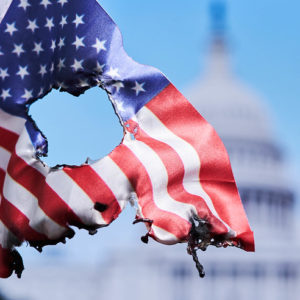For an alternate viewpoint, see “Point: Confronting the Stain of an Insurrection on American Democracy.”
On January 6, 2021, as Congress was preparing to certify officially the results of the 2020 presidential election, a melee took place at the nation’s capital, temporarily stalling the certification process. Later that evening, after the calm was restored, the Electoral College votes were cast, paving the way for another transfer of power in the United States.
Immediately after the fracas at Capitol Hill occurred, many labeled the event an “insurrection.” Others called it an attempted coup. Some even compared it to the surprise attack on Pearl Harbor or the September 11 terror attack.
In actuality, January 6, 2021, was a political protest that devolved into a riot. Nothing more, nothing less. Of course, the protest/riot was a dark day in American history; however, it was not an insurrection.
According to case law, an insurrection is “a violent uprising by a group or movement acting for the specific purpose of overthrowing the constituted government and seizing its powers. An insurrection occurs where a movement acts to overthrow the constituted government and to take possession of its inherent powers.”
Although the actions that occurred that day were far from peaceful, it strains credulity to describe what happened as an actual insurrection under the age-old definition of the term. In fact, the FBI determined “there was no grand scheme” to overthrow the government by the thousands of people who wreaked havoc at Capitol Hill.
Moreover, no single person who participated in the riot/protest has been charged with insurrection. These people were unarmed. They posed no imminent threat. They did not have the wherewithal to overthrow the government and seize its powers.
While holding a demonstration at the Ellipse that day, former president Donald Trump said, among other things, “I know that everyone here will soon be marching over to the Capitol building to peacefully and patriotically make your voices heard.” Those words don’t sound like calls for violence, let alone a rallying cry for insurrection.
Yes, Trump did state, “We fight like hell. And if you don’t fight like hell, you’re not going to have a country anymore.” Even in this statement, he is referring to fighting in the general sense; he was not, under any reasonable interpretation, calling on his supporters to overthrow the government.
What’s more, Trump was impeached by the House of Representatives and charged with “incitement to insurrection.” But he was acquitted by the Senate following a trial. Although this does not carry legal water, it shows that a group of senators with extensive knowledge of the law determined that Trump’s actions did not rise to the level of inciting an insurrection.
Special Counsel Jack Smith has charged Trump with conspiracy to defraud the United States, conspiracy to obstruct an official proceeding, obstruction of and attempt to obstruct an official proceeding, and conspiracy against rights. However, Smith has not charged Trump with 18 U.S. Code § 2383 — Rebellion or insurrection, which states, “Whoever incites, sets on foot, assists, or engages in any rebellion or insurrection against the authority of the United States or the laws thereof, or gives aid or comfort thereto, shall be fined under this title or imprisoned not more than ten years, or both; and shall be incapable of holding any office under the United States.”
In January 2023, a University of Massachusetts poll asked Americans to “select the words that best describe the events that took place on January 6, 2021.” The vast majority (55 percent) selected “riot.” In second place, 49 percent selected “protest.” In third place, 41 percent selected “insurrection.”
Despite the media’s incessant insurrection chorus over the past three years and Congress’ Select Committee to Investigate the January 6th Attack on the United States Capitol, there is a dearth of evidence that those who participated in the riot did so with the ultimate goal of overthrowing the government and seizing its powers. The demonstrators/protesters/rioters who stormed Capitol Hill were frustrated with the outcome of the 2020 election, inflicted property damage, and violated the law, but they did not engage in an insurrection.

